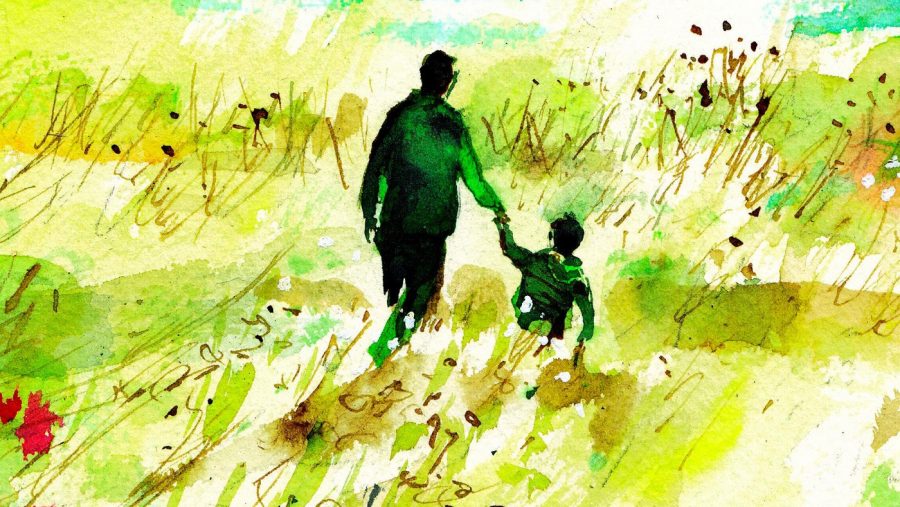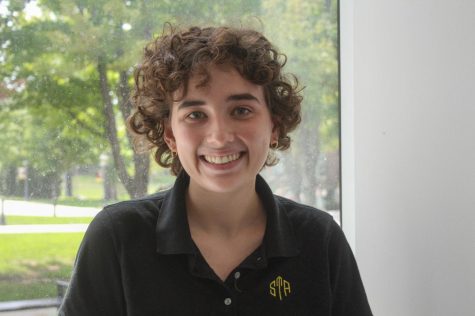“Sea Prayer” is a powerful snapshot of the life of a Syrian refugee
The humanity of the refugee crisis is brought to the forefront in Khaled Hosseini’s new book.
October 29, 2018
Before last summer, I had never read a book for school that I actually enjoyed. Sure, there were some that we read freshman year that I didn’t mind as much as some others, but I would never read any of them in my free time. That all changed when I read my sophomore year summer reading book, A Thousand Splendid Suns by Khaled Hosseini. I read the entire thing in two days, finishing it at 1 a.m. sometime in mid-June. I had never read anything academic that could be described as a page-turner but Hosseini’s riveting novel was nothing less. A Thousand Splendid Suns is a captivating story set against the backdrop of the war-torn Middle East. His latest creation, Sea Prayer, is much the same.
Sea Prayer is a tribute to refugees that have died at sea while attempting to flee war and poverty. It’s written as a letter from a Syrian father to his son Marwan right before the two leave for Europe in a boat. The father begins by describing the life he had as a child and the life his son had but won’t remember. Abstract, brightly colored illustrations by Dan Williams accompany these memories and transport the reader to a peaceful version of Syria in a time when many envision it as nothing but deserts and bombed out buildings.
The second half of the book is much darker, both literally and metaphorically. The drawings become brown and monochrome and Marwan’s father describes a life of trauma and loss for his family. He talks about how uninviting the countries they seek refuge in are and says that he can hear his wife saying to him, “If only they saw, they would say kinder things, surely.”
This line reveals the purpose of the book as a whole: to transport people into the lives of refugees. Hosseini does this so successfully by basing the book on the story of Alan Kurdi, a three-year-old Syrian boy who drowned in the Mediterranean sea while fleeing to Europe with his family. They were denied asylum by the Canadian Department of Citizenship and Immigration, forcing them to resort to the dangerous and illegal passage that led to their raft sinking five minutes after leaving shore. Kurdi’s father has publically said that he blames the Canadian government for his son’s death.
Hosseini mentions Kurdi in the dedication at the beginning as well as the end. By doing this, he takes away the element of fiction and forces the reader to acknowledge the humanity of refugees and stop seeing them as a debate topic. Marwan and his father are the same people that many Americans call terrorists and to empathize with them is to empathize with all refugees.
We read A Thousand Splendid Suns at STA because it’s important and interesting to learn about cultures and experiences other than your own. I can honestly say that reading it gave me a new sense of awareness and respect for women trapped in oppressive governments. The problem is, no matter how brilliant it is, people who can’t or don’t want to read a 400-page book can’t benefit from its message. Sea Prayer is just as powerful as A Thousand Splendid Suns and much more accessible. It’s only 43 pages long and written to be read by a child so the language isn’t very complex. Hosseini has written an emotional first-person perspective for the masses, and it’s just what this country needs right now.
The refugee crisis has been warped by politicians into something complicated and dangerous, but it doesn’t have to be. The heart of the matter is that refugees are human beings that deserve asylum and aid from those of us who are more fortunate. Many Americans and Europeans try to make the problem seem distant and irrelevant, but it’s not. Real people risk and lose their lives every day for a chance at a better life only to treated with hostility by the countries they seek sanctuary in. Sea Prayer gives western people an opportunity to walk in the shoes of a refugee and epitomizes the humanity of the refugee crisis.




